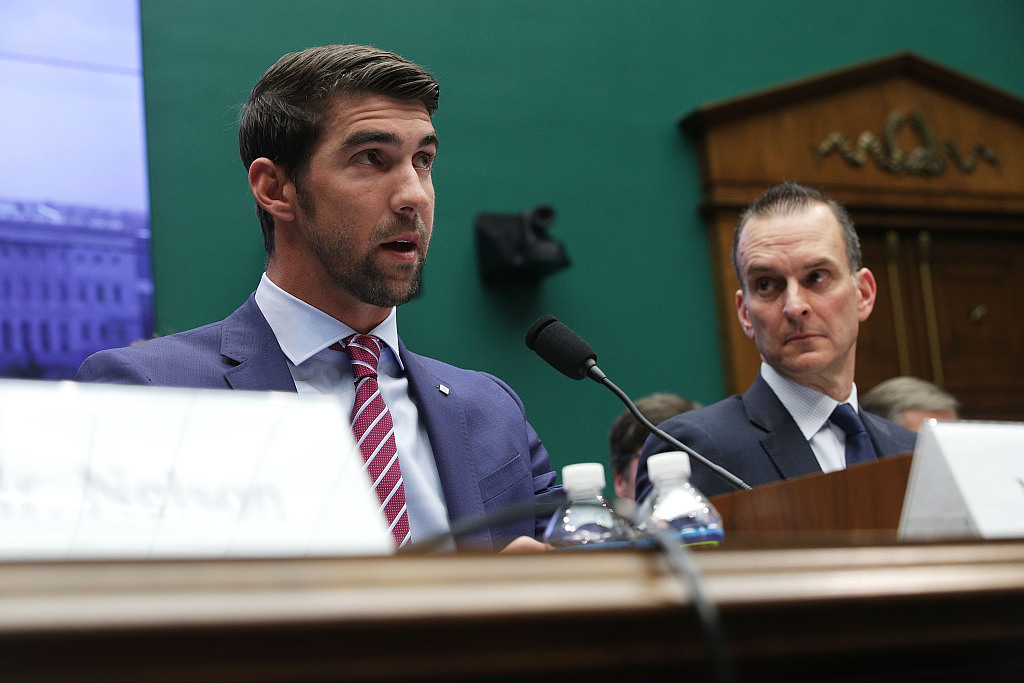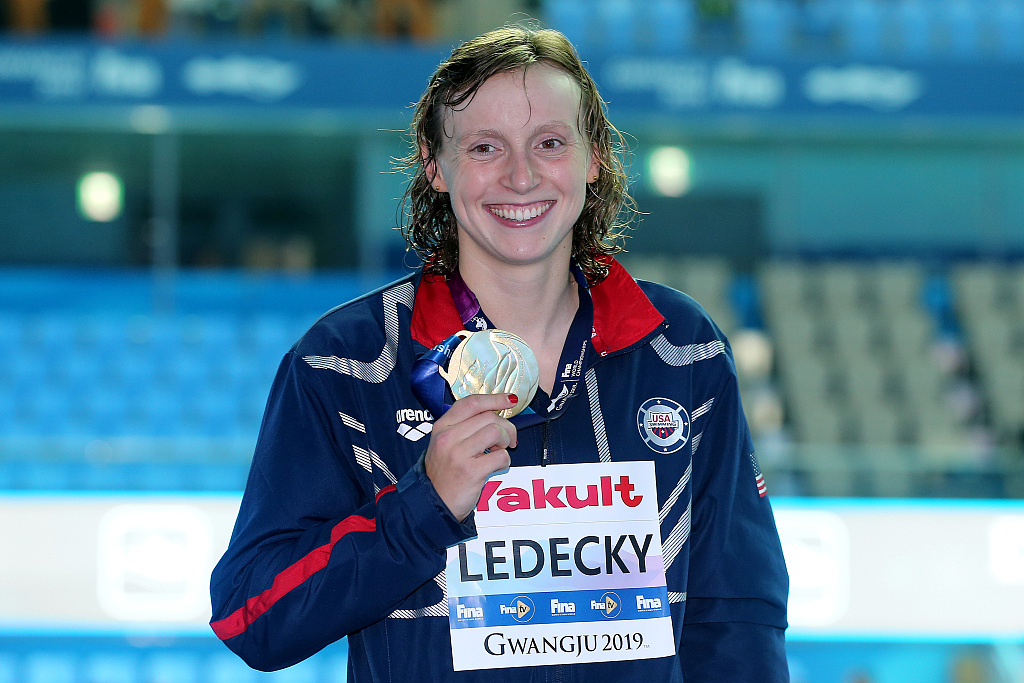The U.S. Anti-Doping Agency (USADA) has come up with a novel random testing program to cope with the unique circumstances brought on by the COVID-19 pandemic, as the country, like much of the world, is under lockdown to slow the spread of the coronavirus.
Earlier in April, USADA launched Project Believe 2020, which is expected to last eight weeks, inviting top athletes to virtually test themselves.
USADA CEO Travis Tygart recently told the New York Times that plenty of top U.S. Olympians were eager to sign up for the pilot project.
Freestyle swimming great Katie Ledecky and athletes Noah Lyles, Allyson Felix and Lilly King were among those who volunteered.

USADA CEO Travis Tygart (R) and American swimmer Michael Phelps attend a hearing before the Oversight and Investigations Subcommittee of the House Energy and Commerce Committee in Washington D.C., U.S., February 28, 2017. The subcommittee held a hearing on "Ways to Improve and Strengthen the International Anti-Doping System." /VCG
USADA CEO Travis Tygart (R) and American swimmer Michael Phelps attend a hearing before the Oversight and Investigations Subcommittee of the House Energy and Commerce Committee in Washington D.C., U.S., February 28, 2017. The subcommittee held a hearing on "Ways to Improve and Strengthen the International Anti-Doping System." /VCG
How does virtual testing work?
Virtual testing means athletes collect blood and urine samples from themselves at home while being monitored remotely on Zoom or FaceTime by testing personnel.
The test kits were sent to athletes, who must produce samples when they receive an unannounced call from a doping control officer.
The officer watches the blood sample being taken, but urine samples are provided in private.
The samples are sealed under the eye of the doping control officer and sent to an accredited lab for testing.
USADA has built safeguards into the system to limit opportunities for cheating.
Although athletes are not observed during collection of urine, they show the monitoring officer the bathroom that will be used, they are timed and the temperature of the sample is recorded to lessen the chances of sample tampering or sample substitution.
Under normal circumstances, a doping control officer of the same gender as the athlete is in the room with the athlete and observes the process.

American swimmer Katie Ledecky wins the women's 800-meter freestyle event during the World Swimming Championships in Gwangju, South Korea, July 27, 2019. /VCG
American swimmer Katie Ledecky wins the women's 800-meter freestyle event during the World Swimming Championships in Gwangju, South Korea, July 27, 2019. /VCG
Comments and feedback on virtual testing
The virtual testing program is the only one of its kind in the world and was begun as USADA's regular in-person, unannounced drug testing has nearly grounded to a halt due to social distancing and other health guidelines during the pandemic, Tygart told USA TODAY Sports in a phone interview Tuesday.
USADA's decision to initiate the new program comes as many nations have stopped doing any knock-on-the-door, out-of-competition drug testing because of the pandemic, leading to worldwide concerns about undetected cheating in Olympic and international sports, Tygart added.
He also said USADA can compare the athlete's urinalysis with previous tests to flag any inconsistencies or irregularities.
"I feel very comfortable with the whole process," said swimming great Ledecky, who carried out her first testing Monday in her Northern California apartment.
"This is the perfect time to test something like this. I think it's great for the circumstances we're all in right now," added Ledecky, who has won five Olympic gold medals and 15 world championship titles, the most in history for a female swimmer.
"I'm willing to be tested any day, any time," she said. "It's part of sport and part of my responsibility as an elite athlete to be drug tested and to compete clean. It's something I feel very strongly about."

The U.S. women's 4x100m medley relay team, (L-R) Regan Smith, Lilly King, Kelsi Dahlia and Simone Manuel pose with their gold medals at the World Swimming Championships in Gwangju, South Korea, July 28, 2019. /AP
The U.S. women's 4x100m medley relay team, (L-R) Regan Smith, Lilly King, Kelsi Dahlia and Simone Manuel pose with their gold medals at the World Swimming Championships in Gwangju, South Korea, July 28, 2019. /AP
Rio 2016 Olympic gold medalist Lilly King, who is the current world record holder in the women's 100-meter and 50-meter breaststroke, said she was a little skeptical of the virtual testing at first.
"Then after I did my first test, I think they really thought through all the potential loopholes with the testing. There are way too many factors that would go into providing a tainted sample for you to really pull that off during the test unless you were a ridiculously high-level crook."
Stressing the importance of temperature in urine testing, King mentioned: "When you have a random test, it would be kind of hard to keep a fake sample at a certain temperature for weeks on end before you know that you're going to have a test."
(With input from AFP)